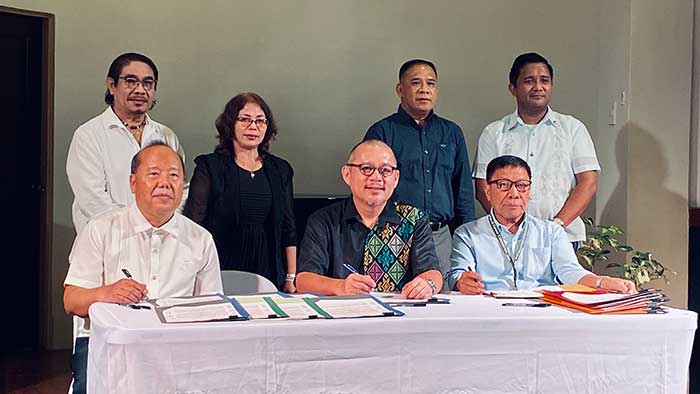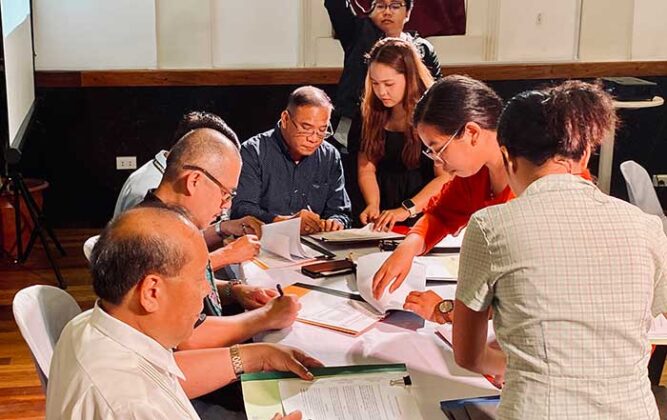By Mariela Angella Oladive
The University of the Philippines Visayas (UPV), the Department of Environment and Natural Resources Region VI (DENR VI), and the Department of Education Region VI (DepEd VI) have formally partnered to advance the Cultural Mapping of Panay and Guimaras Project.
The partnership was solidified through a Memorandum of Agreement (MOA) signed on Monday, June 3, at the UPV Performing Arts Hall.
The MOA was signed by Dr. Clement C. Camposano, UPV Chancellor; Dir. Livino B. Duran, DENR VI Regional Executive Director; and Dr. Victor De Gracia Jr., DepEd VI Assistant Regional Director, and witnessed by key individuals.
The collaboration underscores DENR VI’s role in guiding and supporting cultural mappers in identifying and cataloging the region’s natural assets. It also marks the extension of the mapping project to Negros Occidental with DepEd, aiming to cover all municipalities in the province and broaden the project’s scope and impact.
Chancellor Camposano welcomed the delegates and emphasized the importance of cultural mapping, noting the plural and fluid nature of culture.
“There is a tendency for us to essentialize culture, to fix something inherently fluid, and to make cohesive something that is inherently plural. Culture is plural, evolving, and changing…It is time for us to reflect on the assumptions we make about culture. We, ourselves, are engaged in culture-making every day, and the more we reflect on that, the more aware we become,” Dr. Camposano stated.
The cultural mapping initiative, backed by UPV, DepEd, and DENR, aims to document cultural assets and foster a deeper understanding and appreciation of culture’s dynamic nature.
By doing so, it hopes to contribute to more informed and sustainable cultural preservation efforts.
Anna Razel Limoso-Ramirez, the overall project leader, presented an overview of the project, highlighting its goals and collaborative framework.
The project is a two-year initiative involving UP Visayas, state universities and colleges (SUCs), local government units of the five provinces, the National Commission for Culture and the Arts (NCCA), and the Office of Sen. Loren Legarda.
The project aims to create a comprehensive inventory of the region’s cultural assets, promoting cultural heritage and tourism.
Dir. Duran pledged full support for the project, expressing the department’s readiness to ensure the region’s natural heritage is well-documented and preserved. He also highlighted the potential to promote ecotourism through the project.
Dr. De Gracia Jr. emphasized the importance of mapping in reinforcing cultural roots and fostering national identity.
“If you look at a tall, healthy tree, its roots are twice as long and well spread out below the ground. As long as the roots are healthy, you can be assured of a sturdy tree above. This is what cultural mapping does—it strengthens our roots.
By doing this, we ensure that the people of Region 6 are as sturdy and strong as possible, becoming instruments of development not only for our region but also for the entire Philippines,” he stated.
The signing ceremony was attended by key officials and representatives from various organizations involved in the project, including Prof. Nenia N. Bohulano (ASU), Dr. Leo Andrew Biclar (CAPSU), Dr. Bernardo G. Cagasan (GSU), Dr. Eric De la Vega (ISAT-U), Prof. Genevieve S. Palmares (ISUFST), Dr. Grace C. Pastolero (UA), and Dr. Mary Ann M. De la Vega (WVSU).
The event concluded with Prof. Martin G. Genodepa, CMPG program leader, encouraging all involved to commit to the thorough and dedicated documentation of cultural heritage, highlighting the importance of ongoing collaboration and community involvement in the project’s success.
This MOA signing marks a crucial step in preserving and promoting the cultural heritage of Western Visayas and Negros Occidental, aligning with Republic Act No. 11961, the Cultural Mapping and Enhanced Cultural Heritage Education Program.






















